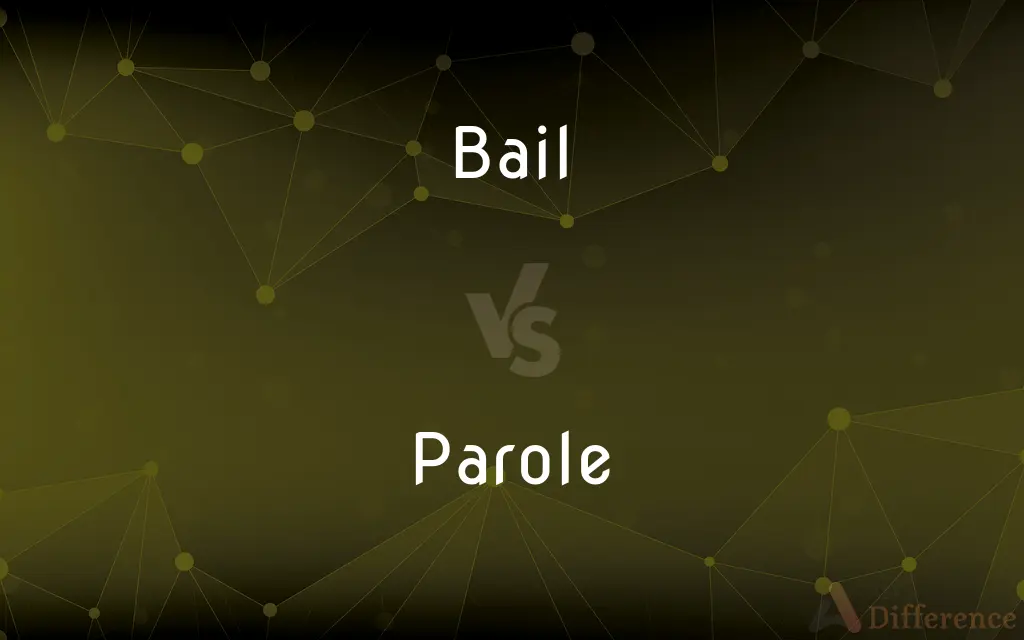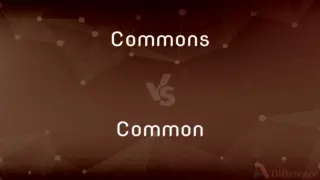Bail vs. Parole — What's the Difference?
By Tayyaba Rehman & Urooj Arif — Updated on May 15, 2024
Bail involves temporary release from custody usually by posting a security, focusing on pre-trial freedom; parole is conditional freedom for a convict after serving part of their sentence.

Difference Between Bail and Parole
Table of Contents
ADVERTISEMENT
Key Differences
Bail is a legal mechanism that allows a suspect to remain free while awaiting trial, typically through a financial guarantee to the court. Whereas, parole is a form of early release from prison, granted to a prisoner who has already served part of their sentence, based on good behavior and adherence to certain conditions.
The purpose of bail is to ensure that the accused returns for trial without the need for continued detention. On the other hand, parole aims to reintegrate convicts into society, rewarding them for rehabilitation and reducing the burden on prison systems.
Bail amounts and conditions are determined by courts, often based on the severity of the alleged crime and the risk of flight. In contrast, parole decisions are usually made by a parole board, which assesses the prisoner's conduct, rehabilitation progress, and potential societal risk.
Violating bail conditions can lead to immediate arrest and the forfeiture of any bail paid. Conversely, violating parole conditions can result in being sent back to prison to continue serving the original sentence or potentially longer.
Bail is primarily a financial arrangement that can vary widely from case to case. Parole, however, involves a set of tailored conditions, such as reporting to a parole officer, which focus on monitoring and supporting the individual's integration into society.
ADVERTISEMENT
Comparison Chart
Definition
Temporary release from custody before a trial.
Conditional release from prison after serving part of a sentence.
Purpose
Ensure appearance at trial without detention.
Rehabilitate and reintegrate into society.
Decision Maker
Court
Parole Board
Conditions
Financial guarantee, may include other terms.
Reporting to parole officer, no criminal activities, etc.
Violation Impact
Arrest and possible loss of financial security.
Possible return to prison.
Compare with Definitions
Bail
Temporary release.
John was granted bail after his family posted the required bond.
Parole
Conditional freedom.
After serving three years, Maria was granted parole based on her good behavior.
Bail
Security payment.
The judge set the bail at $5000, which Paul struggled to pay.
Parole
Early release.
Tom's parole allowed him to leave prison two years earlier than his full sentence.
Bail
Pre-trial freedom.
After posting bail, the accused must regularly check in with the court.
Parole
Parole Board decision.
The Parole Board evaluates each inmate's eligibility for early release.
Bail
Court assurance.
Bail serves as an assurance to the court that the defendant will appear for trial.
Parole
Monitoring compliance.
Parolees must regularly meet with their parole officer to ensure compliance.
Bail
Bail is a set of pre-trial restrictions that are imposed on a suspect to ensure that they will not hamper the judicial process. Bail is the conditional release of a defendant with the promise to appear in court when required.
Parole
Parole is the early release of a prisoner who agrees to abide by certain conditions, originating from the French word "parole" ("speech, spoken words" but also "promise"). The term became associated during the Middle Ages with the release of prisoners who gave their word.
Bail
The temporary release of an accused person awaiting trial, sometimes on condition that a sum of money is lodged to guarantee their appearance in court
He has been released on bail
Parole
Early release of a prisoner who is then subject to continued monitoring as well as compliance with certain terms and conditions for a specified period.
Bail
Either of the two crosspieces bridging the stumps, which the bowler and fielders try to dislodge with the ball to get the batsman out
The Lancashire captain was at full stretch as the wicketkeeper took off the bails
Parole
The duration of such conditional release.
Bail
A bar on a typewriter or computer printer which holds the paper steady.
Parole
A password used by an officer of the day, an officer on guard, or the personnel commanded by such an officer.
Bail
A fastening that secures a crampon to the sole of a boot.
Parole
Word of honor, especially that of a prisoner of war who is granted freedom only after promising not to engage in combat until formally exchanged.
Bail
A bar or pole separating horses in an open stable.
Parole
(Linguistics) The act of speaking; a particular utterance or word.
Bail
Release or secure the release of (a prisoner) on payment of bail
Nine were bailed on drugs charges
His son called home to get bailed out of jail
He was bailed to appear at Durham Crown Court
Parole
To release (a prisoner) on parole.
Bail
Confront (someone) with the intention of robbing them
They bailed up Mr Dyason and demanded his money
Parole
Originally, one's oath or word of honour, given as a condition of release from custody; now specifically, describing the release of a former prisoner under certain conditions, especially the promise of good behaviour.
He will be on parole for nearly two more years.
He was released on parole.
Bail
Secure (a cow) during milking.
Parole
Conditional release of a prisoner (now especially before the end of a custodial sentence), or the term or state of such release; the system governing such releases.
The defendant shall be sentenced to life without the possibility of parole.
Bail
Scoop water out of (a ship or boat)
The first priority is to bail out the boat with buckets
Parole
A word of honor, especially given by a prisoner of war, to not engage in combat if released.
Bail
Abandon a commitment, obligation, or activity
I couldn't handle the crowds, so I bailed
He looks a little like the other guy that bailed on me
After 12 years of this, including Sunday Mass with the family, I bailed
Parole
A watchword or code phrase; military a password given only to officers, distinguished from the countersign, which is given to all guards.
Bail
Security, usually a sum of money, exchanged for the release of an arrested person as a guarantee of that person's appearance for trial.
Parole
(linguistics) Language in use, as opposed to language as a system.
Bail
Release from imprisonment provided by the payment of such money.
Parole
The permission for a foreigner who does not meet the technical requirements for a visa to be allowed to enter the U.S. on humanitarian grounds.
Bail
A person who provides this security.
Parole
(legal) parol
Bail
A container used for emptying water from a boat.
Parole
To release (a prisoner) on the understanding that s/he checks in regularly and obeys the law.
Bail
The arched hooplike handle of a container, such as a pail.
Parole
A word; an oral utterance.
Bail
An arch or hoop, such as one of those used to support the top of a covered wagon.
Parole
Word of promise; word of honor; plighted faith;
This man had forfeited his military parole.
Bail
A hinged bar on a typewriter that holds the paper against the platen.
Parole
A watchword given only to officers of guards; - distinguished from countersign, which is given to all guards.
Bail
The pivoting U-shaped part of a fishing reel that guides the line onto the spool during rewinding.
Parole
Oral declaration. See 1st Parol, 2.
Bail
A small loop, usually of metal, attached to a pendant to enable it to be strung on a necklace or bracelet.
Parole
The release of a prisoner from confinement prior to the end of the original sentence, conditioned on good behavior and often with other specific conditions, such as not to associate with known criminals. Such early release is common where the sentence provides a minimum and maximum term; as, he was released on parole after three years of his five-year sentence; he is out on parole.
Bail
Chiefly British A pole or bar used to confine or separate animals.
Parole
A document authorizing a parole{5}.
Bail
(Sports) One of the two crossbars that form the top of a wicket used in the game of cricket.
Parole
See 2d Parol.
Bail
To secure the release of by providing security.
Parole
To set at liberty on parole; as, to parole prisoners.
Bail
To release (a person) for whom security has been paid.
Parole
A promise;
He gave his word
Bail
(Informal) To extricate from a difficult situation
Always bailing you out of trouble.
Parole
A secret word or phrase known only to a restricted group;
He forgot the password
Bail
To remove (water) from a boat by repeatedly filling a container and emptying it over the side.
Parole
(law) a conditional release from imprisonment that entitiles the person to serve the remainder of the sentence outside the prison as long as the terms of release are complied with
Bail
To empty (a boat) of water by bailing.
Parole
Release a criminal from detention and place him on parole;
The prisoner was paroled after serving 10 years in prison
Bail
To empty a boat of water by bailing.
Parole
Rehabilitation goal.
Parole conditions often include community service and rehabilitation programs.
Bail
To parachute from an aircraft; eject. Often used with out
Bailed out of the damaged airplane at the last possible moment.
Bail
To abandon a project or enterprise. Often used with out
The investors bailed out when it looked as though the company was going to be unprofitable.
Bail
Security, usually a sum of money, exchanged for the release of an arrested person as a guarantee of that person's appearance for trial.
Bail
Release from imprisonment on payment of such money.
Bail
The person providing such payment.
Bail
A bucket or scoop used for removing water from a boat etc.
Bail
A person who bails water out of a boat.
Bail
(obsolete) Custody; keeping.
Bail
A hoop, ring or handle (especially of a kettle or bucket).
Bail
A stall for a cow (or other animal) (usually tethered with a semi-circular hoop).
Bail
A hinged bar as a restraint for animals, or on a typewriter.
Bail
A frame to restrain a cow during milking or feeding.
Bail
A hoop, ring, or other object used to connect a pendant to a necklace.
Bail
(cricket) One of the two wooden crosspieces that rest on top of the stumps to form a wicket.
Bail
(furniture) Normally curved handle suspended between sockets as a drawer pull. This may also be on a kettle or pail.
Bail
To secure the release of an arrested person by providing bail.
Bail
(legal) To release a person under such guarantee.
Bail
(legal) To hand over personal property to be held temporarily by another as a bailment.
To bail cloth to a tailor to be made into a garment; to bail goods to a carrier
Bail
To remove (water) from a boat by scooping it out.
To bail water out of a boat
Bail
To remove water from (a boat) by scooping it out.
To bail a boat
Bail
To set free; to deliver; to release.
Bail
(slang) To exit quickly.
With his engine in flames, the pilot had no choice but to bail.
Bail
To fail to meet a commitment (to a person).
Bail
To secure the head of a cow during milking.
Bail
(rare) To confine.
Bail
To secure (a cow) by placing its head in a bail for milking.
Bail
To keep (a traveller) detained in order to rob them; to corner (a wild animal); loosely, to detain, hold up.
Bail
A bucket or scoop used in bailing water out of a boat.
The bail of a canoe . . . made of a human skull.
Bail
Custody; keeping.
Silly Faunus now within their bail.
Bail
The person or persons who procure the release of a prisoner from the custody of the officer, or from imprisonment, by becoming surety for his appearance in court.
The bail must be real, substantial bondsmen.
A. and B. were bail to the arrest in a suit at law.
Bail
The security given for the appearance of a prisoner in order to obtain his release from custody of the officer; as, the man is out on bail; to go bail for any one.
Excessive bail ought not to be required.
Bail
The arched handle of a kettle, pail, or similar vessel, usually movable.
Bail
A half hoop for supporting the cover of a carrier's wagon, awning of a boat, etc.
Bail
A line of palisades serving as an exterior defense.
Bail
The outer wall of a feudal castle. Hence: The space inclosed by it; the outer court.
Bail
A certain limit within a forest.
Bail
A division for the stalls of an open stable.
Bail
The top or cross piece (or either of the two cross pieces) of the wicket.
Bail
To lade; to dip and throw; - usually with out; as, to bail water out of a boat.
Buckets . . . to bail out the water.
Bail
To dip or lade water from; - often with out to express completeness; as, to bail a boat.
By the help of a small bucket and our hats we bailed her out.
Bail
To deliver; to release.
Ne none there was to rescue her, ne none to bail.
Bail
To set free, or deliver from arrest, or out of custody, on the undertaking of some other person or persons that he or they will be responsible for the appearance, at a certain day and place, of the person bailed.
Bail
To deliver, as goods in trust, for some special object or purpose, upon a contract, expressed or implied, that the trust shall be faithfully executed on the part of the bailee, or person intrusted; as, to bail cloth to a tailor to be made into a garment; to bail goods to a carrier.
Bail
(criminal law) money that must be forfeited by the bondsman if an accused person fails to appear in court for trial;
The judge set bail at $10,000
A $10,000 bond was furnished by an alderman
Bail
The legal system that allows an accused person to be temporarily released from custody (usually on condition that a sum of money guarantees their appearance at trial);
He is out on bail
Bail
Release after a security has been paid
Bail
Deliver something in trust to somebody for a special purpose and for a limited period
Bail
Secure the release of (someone) by providing security
Bail
Empty (a vessel) by bailing
Bail
Remove (water) from a vessel with a container
Bail
Financial arrangement.
Bail amounts are often reflective of the crime's severity and the accused's flight risk.
Common Curiosities
Can bail conditions include non-financial terms?
Yes, bail conditions can also include non-financial terms such as travel restrictions and regular check-ins.
What is the main purpose of parole?
The main purpose of parole is to reintegrate convicts into society under supervision after they have shown evidence of rehabilitation.
Who grants parole?
Parole is granted by a parole board, which evaluates the convict's rehabilitation and behavior.
How long can parole last?
Parole can last until the end of the original sentence period or it can be indefinite, based on jurisdictional laws.
What happens if someone violates bail conditions?
Violating bail conditions can result in arrest and the potential loss of any bail posted.
Can bail be denied?
Yes, bail can be denied if the accused is considered a flight risk or a threat to public safety.
Is bail refundable?
Bail money is usually refunded if the accused complies with all court conditions and appears for their trial.
Are there different types of bail?
Yes, there are several types of bail including cash bail, surety bail, and personal recognizance.
Who sets bail?
Bail is set by a court, usually a judge.
What are common parole conditions?
Common parole conditions include not committing crimes, maintaining employment, and meeting with a parole officer regularly.
What is the main purpose of bail?
The main purpose of bail is to ensure that the accused can remain free while awaiting trial, but with a guarantee to return for court proceedings.
How does one apply for bail?
A bail application is typically made through a court appearance where the accused's lawyer requests bail.
What happens if parole conditions are violated?
Violating parole conditions can lead to a return to prison.
How does one apply for parole?
To apply for parole, the convict or their representative must petition the parole board at scheduled hearings.
What factors influence parole decisions?
Factors influencing parole decisions include the nature of the original crime, behavior in prison, and readiness for reintegration.
Share Your Discovery

Previous Comparison
Commons vs. Common
Next Comparison
Ribose vs. RibuloseAuthor Spotlight
Written by
Tayyaba RehmanTayyaba Rehman is a distinguished writer, currently serving as a primary contributor to askdifference.com. As a researcher in semantics and etymology, Tayyaba's passion for the complexity of languages and their distinctions has found a perfect home on the platform. Tayyaba delves into the intricacies of language, distinguishing between commonly confused words and phrases, thereby providing clarity for readers worldwide.
Co-written by
Urooj ArifUrooj is a skilled content writer at Ask Difference, known for her exceptional ability to simplify complex topics into engaging and informative content. With a passion for research and a flair for clear, concise writing, she consistently delivers articles that resonate with our diverse audience.
















































